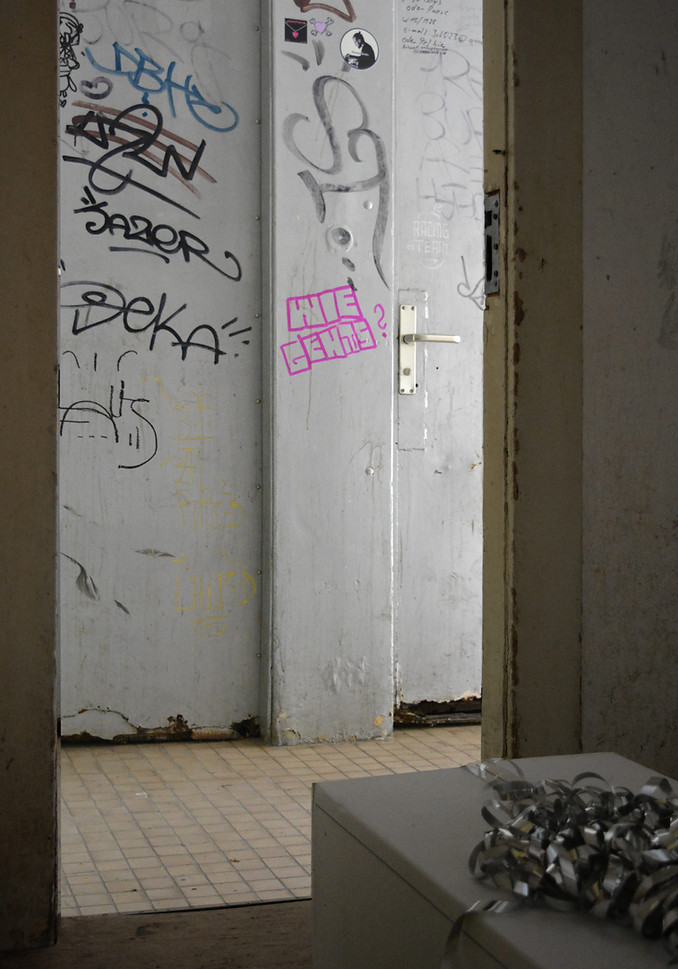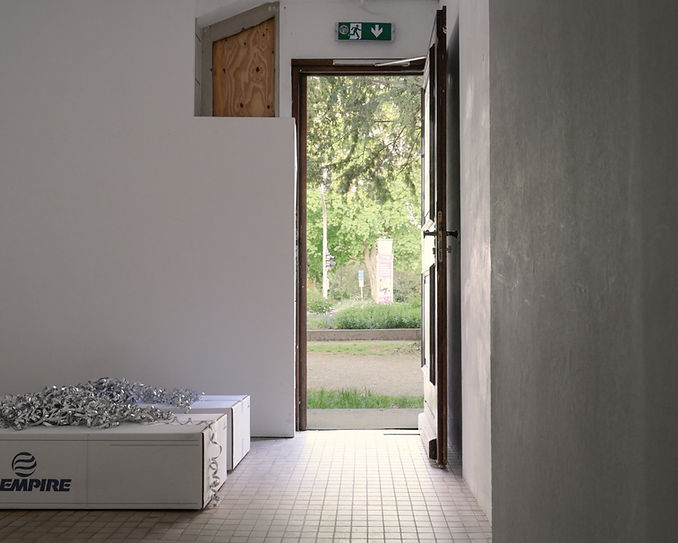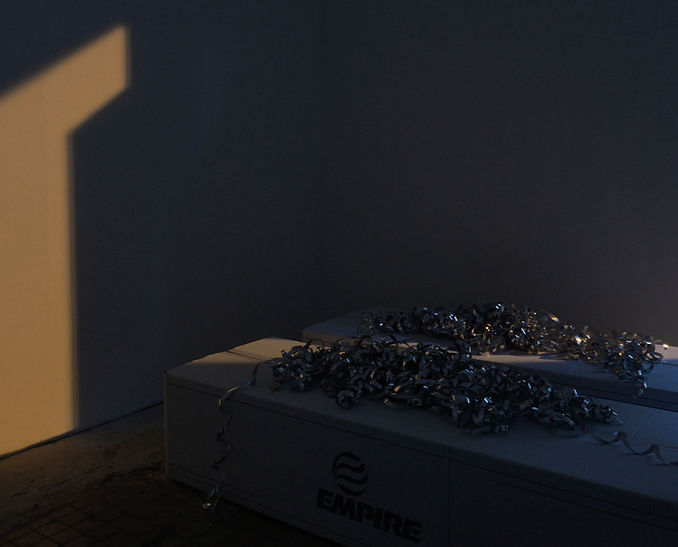
exhibition view : love, solo show at kaiserwache freiburg im breisgau, de
photo ©stefan lux
infos on the exhibition : here
press: contemporary art library, dailylazy


















I could tell you we begin with the viewer as detective. I could tell you that every work becomes a clue and every placement a message. I could tell you this turns the exhibition into a scene, not a scene to be lived in, but a scene to be solved, a scene littered with traces, hints, whispers arranged just so. I could tell you the viewer is meant to arrive late, flashlight in hand, ready to make sense, ready to make a story. I could tell you that this story bends towards closure, that it longs for resolution that the viewer, likein an escape room, is offered the illusion of discovery, a key here, a note there, a plot thickening, a plot diluting, a locked door, a ticking clock, a final sigh of relief. But I could also tell you that no one ever really leaves because the radiant exit signs don’t lead you anywhere, no alarms, no rotting bodies, only the scent of fashionable colognes. I could tell you that you may play the game, yes, you may follow the breadcrumbs, you may turn every object over, search every nook, but you cannot leave the room, leaving is not part of the rules. I could tell you that mystery doesn’t spoil itself, doesn’t unwrap for your convenience. I could tell you the viewer is a storyteller, shaped by the story as much as they shape it, and the detective is someone who judges the story’s ebbs and flows, yet follows its current with devotion. I could tell you that the tyranny of a single story flattens the room, that stories, especially ones that solve too easily, are the true culprits, that mystery, if it is to endure, must resist the straight line, it must scatter itself, it must play dead, it must lure you in and never once turn to face you. I could tell you that this is the answer to the riddle, the key you were looking for, but you’d discover that I’m still in this room with you, and the key was the lock the whole time; that we’ll begin picking this lock to no avail, again and again.
I could tell you about love again and again. I could tell you love is to try again what al- ready failed, but it can only work because it failed. I could tell you about love as something that must single out, that must exclude, that scorches a world in order to sanctify a pair. I could tell you that love is the exaltation of absence, the reaching for something that slips the moment it’s grasped, that the other in love is always already a ghost, and so are you. I could tell you that you can’t even touch your own skin, not really, and this is why you’ll never fully love yourself. I could tell you that love is always two but never just two, that it’s always polygamous, that it subsists on promiscuity, that it leaks, that it swells and spills and refuses to settle, that it’s not unity but the tension between things, the ache of difference, the gaps in your teeth. I could tell you that love is repetition, not sameness, not echo, but the ceaseless insistence on beginning again, the unlearning, the asymmetry, the devotion to what escapes you. I could tell you that love is impossible and yet you persist, and it is precisely this persistence, not in spite of but because of the hate, the absence, the slippage, the ghosts, the futility, that love is what it is and always what it isn’t.
I could tell you that no one ever really speaks of love, when they speak of love, the same way they will not be speaking of “Love,” when they speak of “Love.” I could tell you what you do speak of; that you merely murmur around a safe consensus as if that were enough, but I’d be wrong. I could tell you that a work never speaks for itself, un- less you pretend the artist isn’t still breathing beside it. I could tell you that all I can share is what he shares with me, and the less he says, the more there is to play with, the less there is to say. I could tell you that artists’ conceptions of their own work range from pretty close-and-shut cases, accompanied by heavy-duty files on intent, interests, and speculation, to free-for-alls that open cans of worms here, there, and every- where on a whim while the artists remain silent. I could tell you about his work, about the show you’re witnessing. I could tell you how I’ve long wanted to write about this particular kind of poetics, the kind that doesn’t impose itself, but waits patiently, that trusts in the viewer’s drift and dispenses with their scholarship, while drawn to their naïve consciousness. I could tell you about the essential novelty of the poetic image, the kind Bachelard hones in on, the kind that is difficult to speak of, as it has no past, and for which there may be no general or coordinated approach to its singular philosophy. I could tell you that the poetic image moves in waves, never remaining in one place long enough for “place” to be more than a surface. I could tell you we emerge from language. I could tell you that insofar language constitutes reality, the manner
in which we speak, the concepts we entrech ourselves in, the names that portion our perceptual and cognitive fodder, we emerge as poetic beings, reinscribing reality through poiesis. I could tell you that poetry’s consistency appears as a phenomenon of liberation, not only in its step beyond common language, sometimes beyond grammar and syntax, but even in its attempt to grasp glimmers beyond language altogether.
I could tell you about sculptural installations composed of everyday things, found materials, gestures calibrated to the quirks and peculiarities of a site. I could tell you about a lineage, if we still believed in those, one that would stretch sideways through the brother of Jacques Villon to the chambers of Broodthaers. I could tell you how a thing is different from an object. I could tell you how a thing is not dissimilar from its environment. I could tell you about the apparent simplicity of it all, how nothing is hidden, yet nothing is explained. I could tell you about the things you’re not seeing even though you’re seeing things without assistance. I could tell you about the movement of the sun and how it melts the space into its contents. I could tell you about the refusal of spectacle, the allergy to grand gestures and the suspicion of smooth conclusions.I could tell you about the little pops, the soft ruptures in the everyday, the clichés that aren’t really clichés, just worn-out truths that you can wear like a reversible jacket. I could tell you about the refusal of explaining oneself, about a work that doesn’t refuse as much as defers its own explanation, and in that delay, it becomes alive, that maybe this is what the work is doing at its core. I could tell you that if you suspend meaning long enough for it to breathe it might grow wings. I could tell you about your ears pricking when you hear your name shouted in a public square, you turning around with no one recognizable in sight, no one looking back, you thinking you’d heard your mother calling, but she’d already passed, perhaps your sister, but she’d moved to another continent, you turning once more to head in your initial direction as the astonishment and head rush waned, proceeding into oblivion, not hearing your name called a second time that day, walking around the corner, returning home, jarring the door open to find a surprise party. I could tell you that when I speak of objects and installations, I might as well be speaking of poems, that the boundaries between thing and word blur, and meaning oozes from all the pauses of the tongue and the gaps between the teeth. I could tell you the orthodontist wouldn’t address the gaps because they serve as necessary paths of flight. I could tell you that clarity might be the enemy of thought, and that thought, like love, needs room to morph.
I could tell you about three white cardboard boxes topped with silver spaghetti, which is not really spaghetti, but slices of a mirror and flickers of a movie. I could tell you about closed containers which are storage units, which are white cubes, which are black boxes, which are gilded cages, which are coffins, which are gifts, which are houses, which are doors, which are windows, which are bodies, which are gay, which are twitching, which are absent, which are hard drives, which deal in reverie, which are polished human skulls, which are spilling their contents, which are traces of movements, which are consequences of laws and economies, which sounds insipid, which are only visible with infrared sensors, which are heating units, which are born in Illinois, which are the remnants of empires, which are roses on a grave, which are a new variety, which were celebrated millennia ago, which are starter kits for enterprises, which will be sharply critiqued, which are socks disappearing in washing machines, which are socks hanging high up in trees, which are empty drawers, which are unimaginable, which can only be thought of, which are exact measurements beyond the scientific method, which are uncanny, which do not require for you to believe in them, which conjure romance, which are archaic manuals, which are high-visibility vests, which are checkout dividers, which invent space for possession, which are not quite things, which are rather relations, which hold a speculative charge, which invoke construction sites on paper, which are a breath of fresh air, which are stale bread dunked into milk, which makes your stomach turn, which are beds for the restless, which are building blocks of une petite pratique, which are an image, which are laconically captioned, which are like word collages, which are like poems, which feel like having a Coke with you, which are silver veins for the opiate-hungry, which desire a simple handshake, which are dogs on duty, which take on their position, which are ornaments, which are crimes, which you’ve read about in art catalogues, which are time capsules, which are a deception maneuver, which camouflage something inhuman, which is something hyper-human, which are cardboard boxes with silver ribbons on top.
I could tell you about all of this, but that would turn me into the kind of guide who knows the way, and I don‘t. I could tell you what he told me, but he’d mistaken as well. I could tell you that Kaiserwache used to be a cruising spot, that men loved and lusted after each other in this place. I could tell you that I’ve been wary when it comes to wri- ting about intentional ambiguity, since I’ve failed time and time again at grasping the ungraspable. I could tell you about similar efforts crashing against trees when it co- mes to poetry. I could tell you all of this, but I won’t tell you anything of the sort because these words might take the exhibition for ransom, and I have my doubts about whether you can walk up to an artwork and ask: blink twice if you‘re here against your will.
Ilja Zaharov